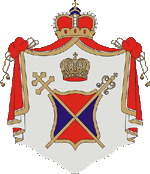
The Montenegrin Orthodox Church is a canonically unrecognized Eastern Orthodox Church. It was formed in 1993 and registered as a non-governmental organization. Antonije Abramović was appointed as its first metropolitan. It claims succession to an older and autocephalous Montenegrin Church, which operated until the unification of the Kingdom of Serbia and Kingdom of Montenegro, later to join the Kingdom of Serbs, Croats and Slovenes in 1918.

Amfilohije was a bishop of the Serbian Orthodox Church, theologian, university professor, author and translator. He was first the Bishop of Banat between 1985 and 1990, and then the Metropolitan Bishop of Montenegro and the Littoral from 1990, until his death. As the metropolitan bishop, he was the primate of the Serbian Orthodox Church in Montenegro. He was one of the most influential leaders of the Serbian Church, and was among the three candidates for the Serbian patriarchate both in 1990 and 2010.
Operation Eagle's Flight was the name of an anti-terrorist operation conducted by the Montenegrin police to arrest a group of Albanians who planned terrorist attacks and an armed conflict in Albanian-inhabited parts of Montenegro. The group of 17 people planned operations from 2004 until their arrest on the night of 10 September 2006. Weapons and explosive material were found in police raids. The group of 17 people were arrested on suspicion of terrorist actions in the 2006 Montenegrin parliamentary election and to create a separate Albanian region in Montenegro. The group was organised by an Albanian association based in Detroit and members of the Albanian National Army, from which they received financial aid and smuggled arms into Montenegro. The group was given a total sentence of 51 years of prison. Relations between the state and the Albanian minority strained after the event.

Serbs of Montenegro or Montenegrin Serbs, compose native and the second largest ethnic group in Montenegro, after the ethnic Montenegrins. Additional 0.64% of the population is made up of Serbs-Montenegrins and Montenegrins-Serbs.

Montenegro has had a motorway since July 13, 2022, when the first section of the Bar-Boljare motorway was inaugurated.

In late December 2019, a wave of protests started against the controversial, newly adopted "Law on Freedom of Religion or Belief and the Legal Status of Religious Communities" which effectively transferred ownership of church buildings and estates built before 1918 from the Serbian Orthodox Church in Montenegro to the Montenegrin state. The Serbian Orthodox Church in Montenegro, which owned 66 mainly medieval monasteries, dozens of churches and other real estate there, insisted the state wanted to impound its assets, while Pro-Western Montenegro's president Milo Đukanović, accused the Serbian church of promoting pro-Serb policies that are aimed at "undermining Montenegrin statehood".
The Freemasonry in Montenegro is becoming more and more numerous, and as a result, their influence on all parts of social life is growing. Although the work of the Montenegrin masons has become more transparent than it was before, it is difficult to know the exact number of those who are in the fraternity. However, according to Dnevne Novine research, there are almost 400 masons in Montenegro.

The Marković Cabinet was the 41st cabinet of Montenegro. It was led by Prime Minister Duško Marković. It was elected on 28 November 2016 by a majority vote in the Parliament of Montenegro. The coalition government was composed of the Democratic Party of Socialists, the Social Democrats, and ethnic minority parties. The cabinet lasted until 4 December 2020, when it was succeeded by the Krivokapić Cabinet, and was the last cabinet of the era of DPS dominance, which lasted from the introduction of the multi-party system in SR Montenegro.

The COVID-19 pandemic in Montenegro has resulted in 251,280 confirmed cases of COVID-19 and 2,654 deaths.
Events of 2020 in Montenegro.

Radoje Pajović was a Yugoslav and Montenegrin historian who worked at the Institute of History at the University of Montenegro for forty years. He has been dubbed "the most prominent Montenegrin historian" of events in Montenegro during World War II by the Montenegrin historian Srđa Pavlović, and Professor Kenneth Morrison, author of the 2009 book Montenegro: A Modern History, asserts that Pajović is one of the most prominent Montenegrin historians in general.

Zdravko Krivokapić is a Montenegrin professor and former politician who served as Prime Minister of Montenegro from 2020 to 2022.

Vladimir Leposavić is a Montenegrin lawyer and politician who served as the Minister of Justice and Human and Minority Rights in the Government of Montenegro and the cabinet of Zdravko Krivokapić from 4 December 2020 to 17 June 2021. Prior to this, he was a senior legal advisor of the Metropolitanate of Montenegro and the Littoral and the Serbian Orthodox Church in Montenegro.

Milojko "Mickey" Spajić is a Montenegrin politician and financial engineer serving as Prime Minister of Montenegro since October 2023. He also served as the Minister of Finance and Social Welfare in the Government of Montenegro and the cabinet of Zdravko Krivokapić from 2020 to 2022.

Jakov Milatović is a Montenegrin politician and economist who is the incumbent president of Montenegro, serving since May 2023. He previously served as the minister of economic development in the cabinet of Zdravko Krivokapić from 2020 to 2022, and as an economist at the European Bank for Reconstruction and Development in London and Podgorica. He is the co-founder and deputy leader of the liberal and pro-European Europe Now! party, currently the largest single political party in the Montenegrin parliament.
In April 2021, a wave of protests, dubbed by its organizers as the Montenegrin Spring, or the Montenegrin Response or Montenegrin Answer, was launched in Montenegro against the announced adoption of regulations that will make it easier to acquire Montenegrin citizenship, but also take away the citizenship of some Montenegrin emigrants, which the protesters consider as an "attempt of the government to change the ethnic structure of Montenegro" and against the Krivokapić Cabinet, which the protesters accuse of being "treacherous" and the "satellite of Serbia".

Ne damo Crnu Goru, lit. 'We won't give up Montenegro', is a moderate right, pro-EU, pro-Serbian Orthodox Church, political organization in Montenegro. It became an influential civil and political movement during the 2020 religion law protests. The group was founded by Montenegrin professors and intellectuals in support of the Serbian Orthodox Church-led protests after a controversial law targeted the legal status and the property of the Church. Its founder and first chairman was university professor Zdravko Krivokapić, who led the opposition party For the Future of Montenegro at the 2020 parliamentary election.

A series of violent protests against the enthronement of Joanikije Mićović of the Serbian Orthodox Church as the Metropolitan of Montenegro and the Littoral took place at the historic Cetinje Monastery in September 2021.

The Europe Now Movement, sometimes stylised with an exclamation mark, is a centrist political organization in Montenegro, founded in June 2022 by former Ministers of Finance and Economy, Milojko Spajić and Jakov Milatović. It describes itself as an economically-focused and anti-corruption movement, and is liberal.
On 23 October 2022, elections were held to elect members of the City Assembly of Podgorica, the capital of Montenegro. Eight parties or coalitions contested for 58 seats, with a 3% vote threshold required to win seats.















